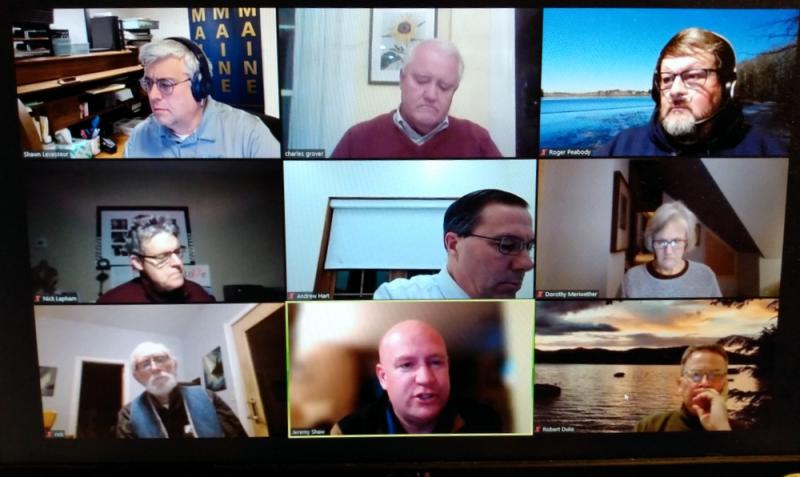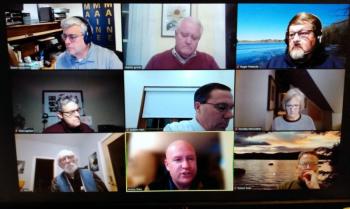Knox Budget Committee wrestles with ARPA funds applications, excludes broadband funding requests
ROCKLAND – Knox County Commissioners and the county’s Budget Committee met via Zoom on Thursday, January 20, in a joint session designed to specifically address the use of the $7.7 million in American Rescue Plan Act funds the county has received.
The Budget Committee struggled as they tried to find their way in determining their role in dispersing the federal funds. Per state statute, the Budget Committee must be involved in dispersing federal funds even though there is no impact on the budget with regards to its bottom line. There will be no costs to taxpayers.
Commissioner Dorothy Meriwether forewarned the Budget Committee members that the Commissioners’ initial screening of the applications took almost five hours.
Of the original applications, some have already been disqualified since they did not meet the criteria. Knox County Administrator Andrew Hart explained the county has already received half of the funds with the other half coming in May of this year. He said they want to expend the total amount of funds and not have to come back for another round of talks in May.
“We can decide how many meetings we want to have,” he said. “But at some point, we need to say this is our last meeting and we are going to decide on an amended budget. A public hearing must be scheduled and a vote taken.”
Hart said even with the pared-down list it still equals $6.4 million in requests. He said they have already spent almost $500,000 in retention stipends through December 31, 2021. This does not take into account the list of requests from the county departments which will not be ready for another two weeks, and Hart said there will be an invoice from the consultant that will come out of the ARPA funds.
Hart told the Budget Committee and the Commissioners at the Jan. 20 meeting, that it would initially make sense to look at the list and say, ‘do we want to keep it on the list or remove it.’
“You really can’t vote dollar items yet because you don’t have the department requests. And things are going to ebb and flow as we go through this and you might want to say you want to keep this on the list and then two weeks later you might say well now we want to remove it from the list because we show this other item is more important. Just because you keep it on the list tonight doesn’t mean it’s approved.”
Both Commissioner Meriwether and Commissioner Sharyn Pohlman gave concise, detailed explanations of the conversations about the applications that preceded the Jan. 20 joint meeting.
Budget Committee member Robert Duke, of Rockport, said he was worried that in the case of food pantries and homelessness, we just keep throwing money at it and doesn’t solve the problem.’
“If we’re going to dole this money out, the money needs to be successful to what the mission is,” he said. “The money needs to be given to organizations that have a successful track record or we are all convinced that it’s going to work.”
In a turn-around from her previous position, Meriwether asked the Rockport’s request for internet funding be added back onto the list for consideration. After a short debate, the Budget Committee voted not to add it back in. Duke, however, was sympathetic to the smaller outlying town's requests for broadband funding assistance.
The committee spent much time debating the dollar amounts and their intended uses. The issue of homelessness engendered many opinions and comments.
Hart suggested the committee focus on the organization and not the dollar amount that evening, to eliminate applications deemed ineligible, or not applicable in the Budget Committee's opinion.
Hart said he would forward the revised list to budget committee members and commissioners. They are scheduled to meet again on February 3, in another Zoom meeting. He also said the county’s lists of requests would be ready by the next meeting.
How are other Maine counties distributing their county ARPA funds?
Waldo County Clerk Barbara Arseneau said Waldo County did not invite applications for the ARPA funds, though several organizations did reach out to them. Instead, Waldo County dedicated funds to each of the municipalities in the amount of $20,000. Waldo County has 26 municipalities, so a total of $520,000 was dispersed.
Waldo County received $7.7 million in funds; less the $520,000 dispersed leaves $7.182 million be used.
Arseneau said municipalities were not told what to use the funds for, but to make sure their targeted uses fell within federal guidelines. Arseneau said many of the municipalities put the funds to use towards broadband efforts.
Waldo County had several projects that needed to be done and the County Commissioners hired an attorney to make sure their needs fell under ARPA rules.
Arseneau said the decision to allocate funds did not fall to the Waldo County Budget Committee but did say the committee has been kept apprised.
Kennebec County Administrator Scott Ferguson said that the county has yet to do anything with its funds.
“We are in the process of putting someone in place to manage those funds,” he said. “Once that person is in place, we’ll start reviewing the applications we have received.”
Ferguson said the county received 30 or so applications with a deadline of January 28, 2021.
Kennebec County has received $23 million in federal funds. Like Knox County, half was received with the other half scheduled for deposit with the county in May.
Ferguson said the county has more requests than funds. He said that with no requirement to disburse the funds until 2024, the county is trying to be deliberate in the process.
Sandy Gilbreath, project manager at the Lincoln County Planning Commission, said Lincoln County received $6.7 million.
Lincoln County did not have an application process like Knox County. She said they received approximately 20 letters from people outlining needs, or asking for a specific amount for a project.
“We started by holding a series of workshops this summer with towns and municipal leaders, legislators, and county departments,” she said. “We also held a specific workshop for individuals that were working in the theater of eligible uses for the ARPA funds such as sewer and water, infrastructure, public health, economic development, and broadband.”
Gilbreath said the process provided a needs assessment.
“There was a one-time stipend for essential county employees,” she said. “There was a use for infrastructure at the communications center for COVID safe desks and training for EMS workers so we can get some more EMS workers.”
Gilbreath said they have not committed all of their $6.7 million, only a portion, and they still have a way to go.
Hancock County Administrator Scott A. Adkins said the county awarded premium pay to some county employees and some of the municipalities. The county also made upgrades to the computer infrastructure.
Like Kennebec and Knox counties, Hancock County hired a consultant to review requests for eligibility. Hancock County received $10.6 million in relief funds. Adkins said the county has yet to spend any of those funds on broadband requests.
“I think the future of Maine, not just Hancock County, but Maine is the broadband infrastructure,” he said. “That will relieve a lot of problems. It will make addressing mental health much easier, it will create an economy that will make housing more affordable.”
Adkins responded to Gov. Janet Mills's recent creation of a broadband authority by saying he was hesitant of the program and felt the issue should be handled at the local level.
Adkins said the county ran a grant program for nonprofits that were negatively impacted by COVID, and he said they did not get as much response as they had hoped or anticipated.
Adkins said Knox Administrator Andrew Hart was doing a great job in handling what he called, “the chaos, of it all.”
“Knox is structured and well organized,” he said. “I think in the end, calmer heads will prevail.”
Event Date
Address
63 Union Street
Rockland, ME 04841
United States





























